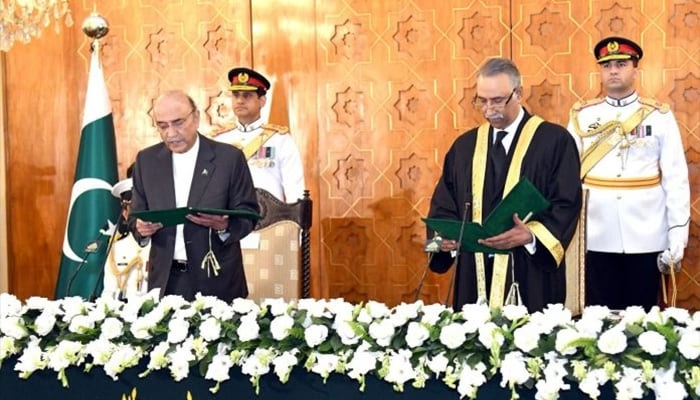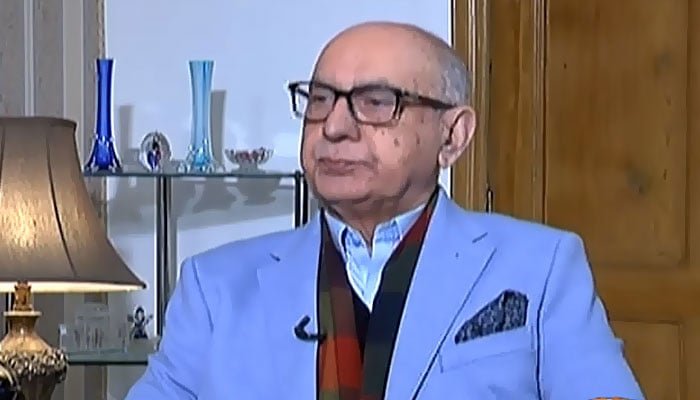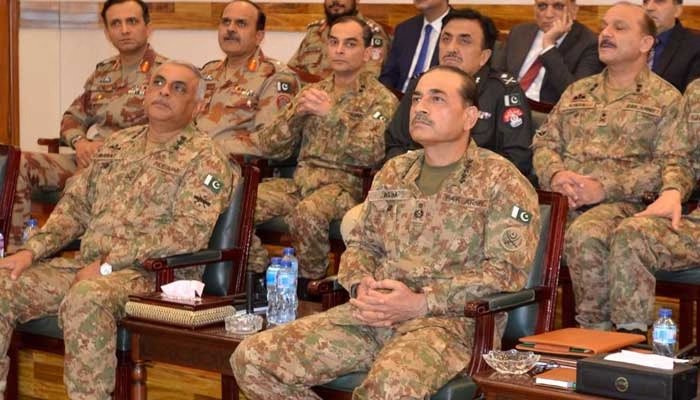In a significant development for Pakistan’s judicial landscape, the acting chief justices of all four provincial high courts were officially sworn in as regular chief justices on Tuesday, marking a major moment of transition and stability within the country’s judiciary.
The swearing-in ceremonies followed official notifications issued by the Ministry of Law and Justice, and were approved by President Asif Ali Zardari, signaling the conclusion of a months-long period where several high courts had been operating under acting leadership.
Islamabad High Court: Justice Muhammad Sarfraz Dogar Takes Oath
President Asif Ali Zardari administered the oath to Justice Muhammad Sarfraz Dogar, officially instating him as the Chief Justice of the Islamabad High Court (IHC). The ceremony was held at Aiwan-i-Sadr and was attended by prominent figures including Senate Chairman Syed Yousuf Raza Gilani, Punjab Chief Minister Maryam Nawaz, various ministers, parliamentarians, senior judges, lawyers, and media personnel.
Justice Dogar had been serving as the acting chief justice since February. His appointment initially drew legal scrutiny when five sitting IHC judges challenged his elevation in the Supreme Court. The petition, filed by Justices Mohsin Akhtar Kiyani, Tariq Mehmood Jahangiri, Babar Sattar, Sardar Ejaz Ishaq Khan, and Saman Riffat Imtiaz, also contested the transfer of three judges to the IHC.
However, the Supreme Court on June 19 dismissed the petitions and upheld Justice Dogar’s position as acting chief justice. Later, President Zardari formally declared him the senior-most judge of the IHC, following a revised seniority list issued by the Ministry of Law and Justice. Despite this, the five petitioning judges have filed an intra-court appeal, asking for the June 19 judgment to be overturned in the interest of judicial fairness and transparency.
Peshawar High Court: Justice Syed Muhammad Attique Shah Sworn In
The oath-taking ceremony for Justice Syed Muhammad Attique Shah as the Chief Justice of the Peshawar High Court took place at the Governor’s House. Khyber Pakhtunkhwa Governor Faisal Karim Kundi administered the oath in the presence of several high-profile attendees.
Notably, Chief Minister Ali Amin Gandapur and Federal Minister Amir Muqam were seen engaging in friendly conversations during the event, showcasing a rare moment of political camaraderie between leaders from opposing parties. Such scenes offer hope for greater cooperation between rival political camps, especially in the governance of crucial institutions like the judiciary.
Balochistan High Court: Justice Rozi Khan Barrech Assumes Office
In Quetta, Governor Sheikh Jaffar Khan Mandokhail presided over the ceremony to administer the oath to Justice Rozi Khan Barrech as the Chief Justice of the Balochistan High Court. This appointment is expected to bring much-needed leadership continuity and stability to the court, which plays a key role in addressing legal matters in one of the country’s most underdeveloped and geopolitically sensitive provinces.
Sindh High Court: Justice Junaid Ghaffar Officially Sworn In
In Karachi, Governor Kamran Tessori administered the oath to Justice Junaid Ghaffar at a formal ceremony held at the Governor House. A screengrab of the event shared by Geo News showed a dignified ceremony with members of the legal fraternity and senior government officials in attendance.
Justice Ghaffar’s confirmation brings closure to a period of uncertainty in the Sindh High Court’s leadership and is seen as a positive step towards strengthening judicial administration in the province.
A Milestone for Judicial Stability
The swearing-in of permanent chief justices across all four provincial high courts is a crucial development for Pakistan’s legal system. For months, courts had been led by acting justices, raising concerns about continuity, seniority, and judicial independence. The confirmation of these appointments is expected to enhance decision-making, reduce internal friction, and ensure that the judiciary continues to operate with efficiency and authority.
The appointments also reflect a renewed emphasis on merit and seniority within the judicial system, although recent legal challenges in the IHC highlight ongoing debates about judicial transparency and constitutional processes.
As Pakistan continues to grapple with complex political and legal challenges, these appointments could usher in a new era of judicial responsibility and institutional strength — a step forward in upholding the rule of law across all provinces.



